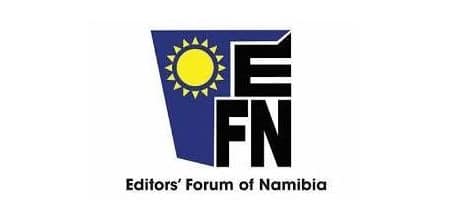By Frank Steffen, Chairperson
The Editors’ Forum of Namibia (EFN) executive committee met on Friday, October 06 to discuss various issues.
The ExCo meeting also came amid the EFN being inundated with enquiries by media, who requested a formal response to the suspension of the Managing Editor of the state media newspaper, New Era, Johnathan Beukes.
It needs to be pointed out that the EFN is a representative-driven organisation, which expresses views as a joint industry. At Friday’s meeting, ExCo deliberated on this issue and took a position as regards the suspension of Beukes.
It is never good news, when an editor is suspended from duty on account of having expressed his concerns, no matter the issue at hand – he did so after all while under the impression that he was the managing editor, who would normally have no need to consult with anybody, when writing an editorial or opinion piece.
It is the EFN’s understanding that the managing editor in this case would be reporting to the CEO, who would seem well advised to respect the accepted tenets that direct actions on management level against any and all editorial staff, having specifically considered the freedom of expression that is so important to the media. That is what press freedom is all about at the end of the day.
It seems strange for the Chief Executive Officer of New Era, Christof Maletsky, who has a journalistic background after all – to publish an article on the front page, in which he not only publicly accuses the Beukes of wrongdoing, but for all intents and purposes already finds him guilty of a contravention. This seems to boil down to no less, than an editor having shown strength of character by criticising a department of state (albeit justice), which seems to have totally disregarded his repeated enquiries.
To suspend a journalist or editor based on a so-called transgression, which in fact was no more than a cry for help, a public call addressed to a state department, asking it to adhere to the principle of transparency, surely cannot then be excused as an exclusively internal matter after the personal attack on Beukes on the front page of New Era. It became a public matter the very moment, the CEO published his article and he should at least react to enquiries directed at him, as he seems to find it in order to publicly accuse a colleague.
The EFN totally subscribes to the principle of accountability and it promotes the adherence to the Code of Ethics and Conduct for the Namibian Print, Broadcast and Online Media that regulates the Namibian media industry. In the matter under review, it seems as though management single-mindedly pursued a matter, which normally should have resulted in an aggrieved party having submitted a complaint to the Media Ombudsman.
Seeing that no such complaint was registered, it would seem as though there is no aggrieved party, which then begs the question why management decided to suspend the managing editor. The EFN could have possibly respected the decision of management to suspend the editor had there been a formal complaint, which would clearly allude to suspected negligence, ill intent or malfeasance.
Having considered the above arguments, the EFN has decided to approach the Media Ombudsman, John Nakuta, with a view towards reviewing the article or editorial that according the NEPC does not stand up to the criteria laid down by the Code of Ethics and Conduct for the Namibian Print, Broadcast and Online Media. The EFN would in fact prefer that the Media Ombudsman in this matter consults with the previous Media Ombudsman, Clement Daniels, to thus jointly assess this matter, before arriving at a conclusion.
The EFN appeals for the management of New Era to support press freedom, not only in letter, but also spirit:
“Freedom of the press or freedom of the media is the fundamental principle that communication and expression through various media, including printed and electronic media, especially published materials, should be considered a right to be exercised freely. Such freedom implies the absence of interference from an overreaching state; its preservation may be sought through the constitution or other legal protection and security. It is in opposition to paid press, where communities, police organisations and governments are paid for their copyrights.”



Leave a Reply